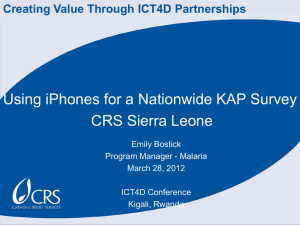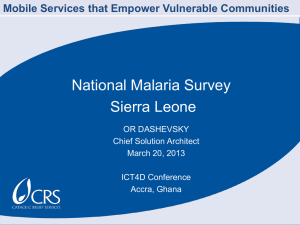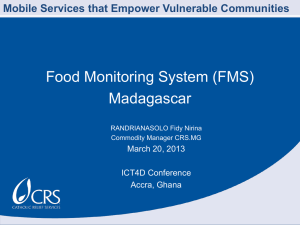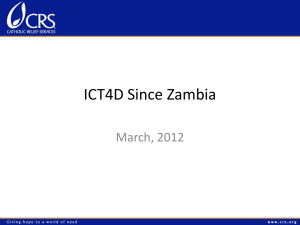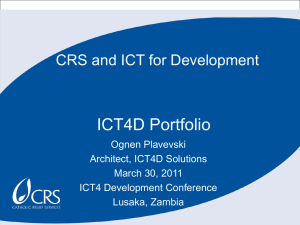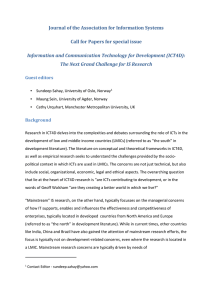CRS ICT4D Strategy - ICT in Agriculture
advertisement
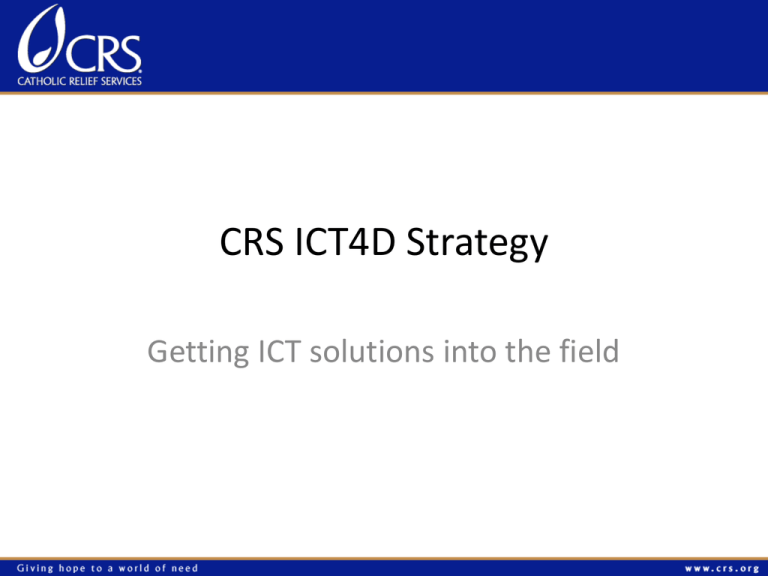
CRS ICT4D Strategy Getting ICT solutions into the field ICT4D Strategy • Goal: – Mainstream the use of ICT 4D solutions • Background: Technology – Cross-divisional ICT4D Team established – Strategy developed in FY2010 • Approach: 1. Build commitment to use ICT4D solutions 2. Establish an ICT4D knowledge exchange program 3. Build and maintain a portfolio of ICT4D solutions 4. Develop CRS’ capacity to deploy and sustain ICT4D solutions Change Strategy Processes People 2 Agriculture aims to balance community needs with information management Enhance • • • • • Productivity Profitability Skills Asset management Financial guides Enable • • • • • Distance learning Data collection* Data sharing* Data Mapping* Data services Key Issues in Development and Deployment • • • • Support innovation to create portfolio of pilots Build capacity to take pilots to production Establish a help desk to support users Share information broadly – Webinars – ICT4D conferences – Mar 2010 – Sep 2010 – Mar 2011 – Mar 2012 Nairobi Washington Lusaka Kigali 4 Farmbook components IFormBuilder Digital forms Project set up Distance learning / training materials Baseline / impact Crop monitoring MEAS Learning products Agilix LMS Platform Farmer registration Farm log Business planning Profitability analysis Farmbook Forms Baseline Register clients Develop business plan Profit analysis Production schedule Farm visit log Performance monitoring Impact Distance Learning with Agilix “To Go” Course Monitoring Distance Learning Great Lakes Cassava Initiative • 1,116,651 farmers • 3023 farmer groups • Click on for data – By year – By M&E points Relational Database Forms input Reports Services Biz Plan Cloud hosted services and databases outputs Consolidated Database clients Data cleaning facility Device options Data process management MAPS Trends Polls Data Market impact Super users set up and filtering Demonstration: Data and mapping Register Beneficiaries Deliver Services Track/Report What are we working towards? • Cloud based: Standardized processes and products with streamlined management and costs. • Farmer facing data: provide customized information that helps farmers first and then assists our record keeping • Improved capacity: Develop a system that assists field staff to learn new skills and provide better training. • Benchmark technology: New tools enable field staff to monitor effectiveness of technology and training. • Data Management: Field workers engaged in data sharing, management as well as project managers • Accountability: Data that has multiple audiences over time and locations
